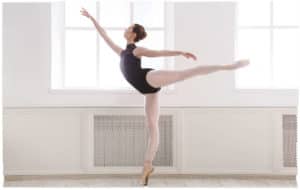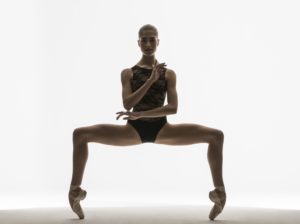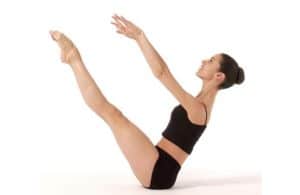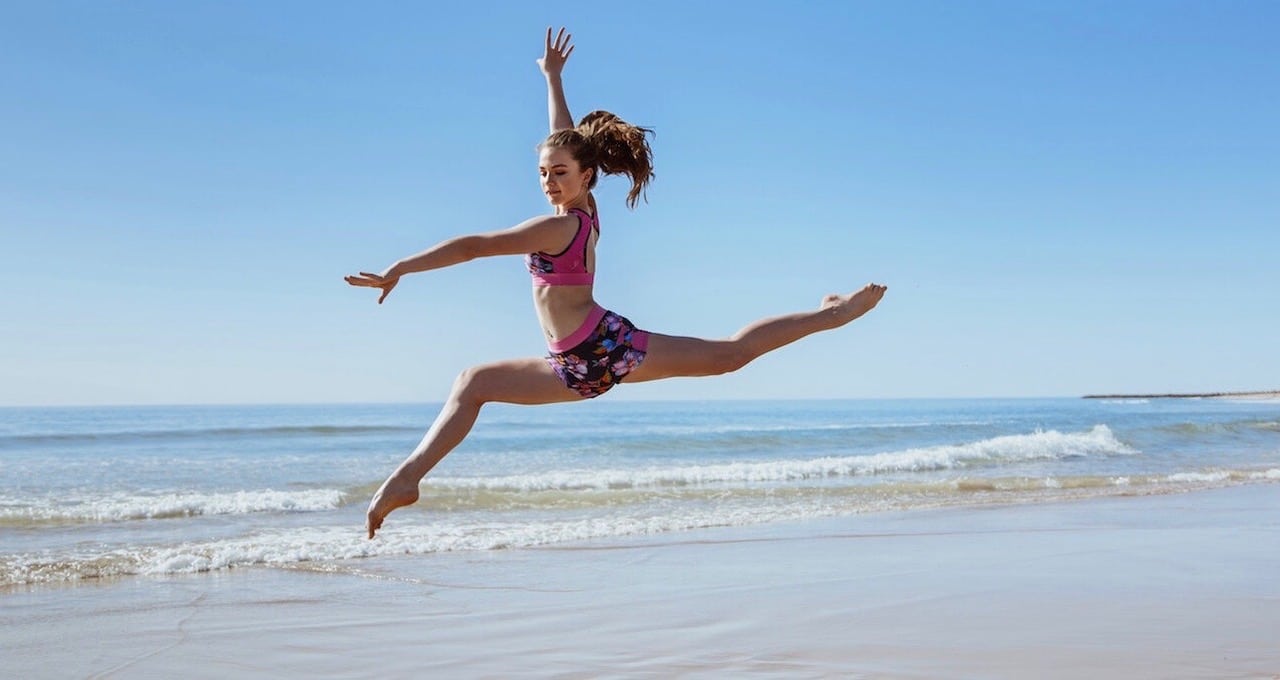We all dream about doing a super high grand jeté. Having the audience be in awe of the moment you appear to be floating in the air. Not only does it look amazing, it also feels amazing to watch (and do!). But how do we get our jumps to look and feel like that? Despite spending years working on our jumps, sometimes it feels like we aren’t making the progress we need or want to make. Luckily jumps are one of those things where there’s always something we can improve upon. In order to make your jumps go from a ‘leap frog’ to more of a ‘leaping jeté’, we’ve provided five key areas to focus on so you too can be soaring through the air, having the audience marvel at the height and grace you exude.
Flexibility
Flexibility is important for your jumps. If you want to achieve a split in the air you first need to be able to do it on the ground.
Daily stretching will improve your flexibility, enhancing the line of your jumps. But don’t overdo how much you are doing each day. When it comes to stretching ensure that your body is warm before you go straight into a split. Start by doing some gentle stretches like bending forward to reach your toes, spinal twists on the ground or pulling your knees to your chest to start getting the blood flowing. Once your body starts to feel a bit warmer you can start attempting more intense stretches including hip openers, hamstring stretches, centre, left, and right splits. Progressing slowly through your stretches doesn’t mean you aren’t making any progress with your flexibility. Your flexibility will still improve and you’ll also prevent any muscular strains or injuries. Remember, Rome wasn’t built in a day!

Plie Deeper
Plié’s are the underlying foundation for most dance movements. They start and end almost all steps in ballet, are the initiation of nearly every turn, and are a must for the take off and landing of every good jump.
A deep plié is important for achieving the height you need to execute a jump. The deeper the plié, the more power you’ll have in your legs to push off the ground.
When jumping off the ground think ‘heel, ball, toe’, like rising up to demi pointe. This is not only essential for power, but also for ensuring you have a nice point for the jump you are attempting. Regardless of how many steps you take to prepare for the jump, make sure you really bend your knees to gain as much strength as you can. Bending and straightening the knees doesn’t seem that hard but plié’s are a powering movement that help protect the body from injury and give you the ability to jump with ease.

Control the Landing
What goes up must come down! A jump isn’t complete until it’s landed safely. As soon as your feet leave the ground you should begin to think about your landing. Try to hit the floor as softly and quietly as possible and never come out of a jump with straight knees as it will almost always cause injury. If landings feel like your weak spot, practice jumps holding on to the barre. This way you can use your arms to help control the descent. Think of landing ‘toe, ball, heel’ – the opposite of what you do when taking off. Articulating the feet is not only essential to the take off of a jump but for the landing as well. Maintaining alignment when landing is also crucial to avoid that crumpling down appearance. Feel as though you’re being lifted from the top of your head throughout the entire duration of the jump.
Breathe
Sometimes when we are executing a movement that’s a bit more difficult we start to hold our breath. While we may think this is making things easier, it’s actually making it a lot harder. Holding your breath prevents the circulation of oxygen. This reduces what gets delivered to the muscles, making them fatigue at a faster rate and increasing the build up of lactic acid – causing those heavy legs we can sometimes get at the end of a hard class! To prevent this from happening be aware of your breath when you are jumping.
Awareness of your breath will not only improve the circulation of oxygen, it will also improve the height of the jump and help release excess tension.
If you take a deep breath at the peak of your jump, it can also make it seem like you’re soaring through the air. Decide whether you prefer exhaling on the jump or on the landing and do what works best for you.
Strength
Incorporating strength training isn’t meant to make you stiff like a pogo stick when jumping. It’s intended to improve the execution and aesthetic of jumps and prevent the onset of injuries.
Good core strength and alignment are crucial to almost all aspects of dance, but especially with jumps.
By performing repetitive movements such as sit ups, mountain climbers or supine toe taps to work on your core, you’ll gradually be able to build up the strength that will support you when you are jumping. Having a strong core allows the rest of the body to stay connected without the added tension. Strength work also includes working on your glutes and legs. Improving the strength of these areas will further enhance your jumps and assist with the execution as they do a lot of the work when it comes to jumping. Think of doing pilates leg circles, bridges and ‘swimmers’ (when you lay on your stomach and kick your arms and legs like you’re swimming) to strengthen your glutes and legs.

When it comes to jumps (as with most aspects of dance) we are always striving for perfection. However, perfection isn’t always a realistic goal because let’s face it, no one is perfect! When practicing and performing jumps try not to be too hard on yourself. It’s okay if things don’t go exactly as you intended. As long as you can still learn something from it (even if it’s not what to do!) you are still improving and growing. Think back to where you were, where you are now, and how much you have improved. Sometimes we need a little check in to appreciate all of our hard work!
Article by Sheree Ronai-Horvath courtesy of www.energetiksblog.com.au



